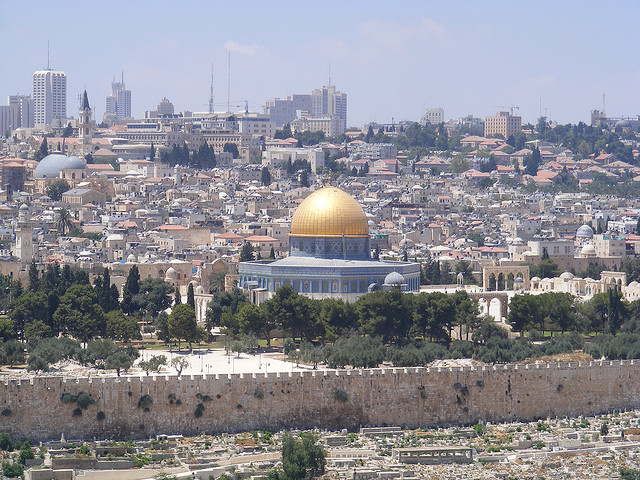Today’s reading: 2 Samuel 22-24.
“A place belongs forever to whoever claims it hardest, remembers it most obsessively, wrenches it from itself, shapes it, renders it, loves it so radically that he remakes it in his own image.” Joan Didion
A small piece of Middle-eastern real estate claims an exaggerated importance in today’s geopolitics. It’s called the temple mount, and the Israelis and the Palestinians both claim it. The Dome of the Rock, one of Islam’s holy sites, has occupied the location since 690 AD (though the Crusaders claimed it from 1099 to 1187 AD). Muslims believe that Mohammed ascended into heaven and returned at this spot. Until the Romans destroyed it in 70 AD, the Jewish Temple built by Herod stood there. Before Herod’s temple Solomon’s temple crowned the hill. Many believe the ground beneath the Dome of the Rock was the location of the Holy of Holies in the Jewish Temple. In the days of Abraham it was known as Mt. Moriah, where Abraham brought Isaac to be sacrificed at God’s command (though God stayed his hand at the last moment).
But King David may have had as much influence as anyone, other than God, in solidifying the significance of this few acres of land. His action was born of desperation, proceeded to sacrifice, and culminated in God’s grace.
In the later years of his reign, David presumptuously took a census of all the fighting men in Israel. This had been done before, but only on God’s order. David did it in spite of the objection of his counselors. He may have been considering whether to start a new military conquest, or perhaps he wanted assurance of security, or he may have simply acted out of pride. After David completed the census, he was “conscience-stricken” and confessed his sin. The prophet Gad came to David and gave him the option of three different forms of discipline: famine, pursuit by his enemies for three months, or three days of plague. David chose to put himself at God’s mercy and chose the plague. Soon 70,000 Israelites died, but before the plaque spread further Gad told David to go and make an offering on the threshing floor of a local nobleman named Araunah.
Araunah said, “Why has my lord the king come to his servant?” “To buy your threshing floor,” David answered, “so I can build an altar to the LORD, that the plague on the people may be stopped.” Araunah said to David, “Let my lord the king take whatever pleases him and offer it up. Here are oxen for the burnt offering, and here are threshing sledges and ox yokes for the wood. O king, Araunah gives all this to the king.” Araunah also said to him, “May the LORD your God accept you.” But the king replied to Araunah, “No, I insist on paying you for it. I will not sacrifice to the LORD my God burnt offerings that cost me nothing.” 2 Samuel 24:21-24
David purchased the land and made the offering and God stopped his destroying angel as it passed by Araunah’s threshing floor. Second Chronicles 3:1 makes it clear that Solomon chose this very spot on Mt. Moriah to build the first temple.
I don’t know of any spiritual power that resided on these few acres of cleared land used to separate the wheat and chaff, but there is much spiritual history there. And each of these events adds another layer to the rich tapestry of God’s redeeming grace.
- Abraham learned that God would provide the necessary sacrifice so his son could live. God became Jehovah-Jireh, the one who sees the need and sees that it is provided for.
- David learned that there is mercy in God’s judgment, that our sins have consequences, and that sacrifice for sin costs something.
- Solomon built the temple here according to God’s plan and saw the glory of the LORD inhabit it.
- When this first temple was lost because of the idolatry of the Israelites, God allowed the remnant to return and rebuild.
- Jesus did much of his teaching in the later version of the temple that had been grandly remodeled by Herod. The son of God, full of grace and truth, walked through the courts of the building where God’s mercy was gracefully bestowed on his people.
- After Jesus’ death and resurrection his disciples continued to teach and perform miracles in the temple. But within forty years of the Jewish nation’s rejection of Jesus, the temple was destroyed and has never been rebuilt.
I would modify Joan Didion’s quote to say, “a place belongs forever to whoever claims it hardest unless God claims it.” God has his claim on the piece of land once known as Mt. Moriah. He has promised that Jesus will return to rule and reign from Jerusalem. Much turmoil will continue to swirl around the temple mount until then, but we can be sure of Jesus’ return there, just as we are certain that God has demonstrated his grace there time and time again.
Image by Paul Simpson on Flickr, CC by 2.0

Be sure my friend, be very very sure.
Pingback: BIBLE DAILY DEVOTIONAL – 2 Samuel 24 – The importance of place | ChristianBlessings